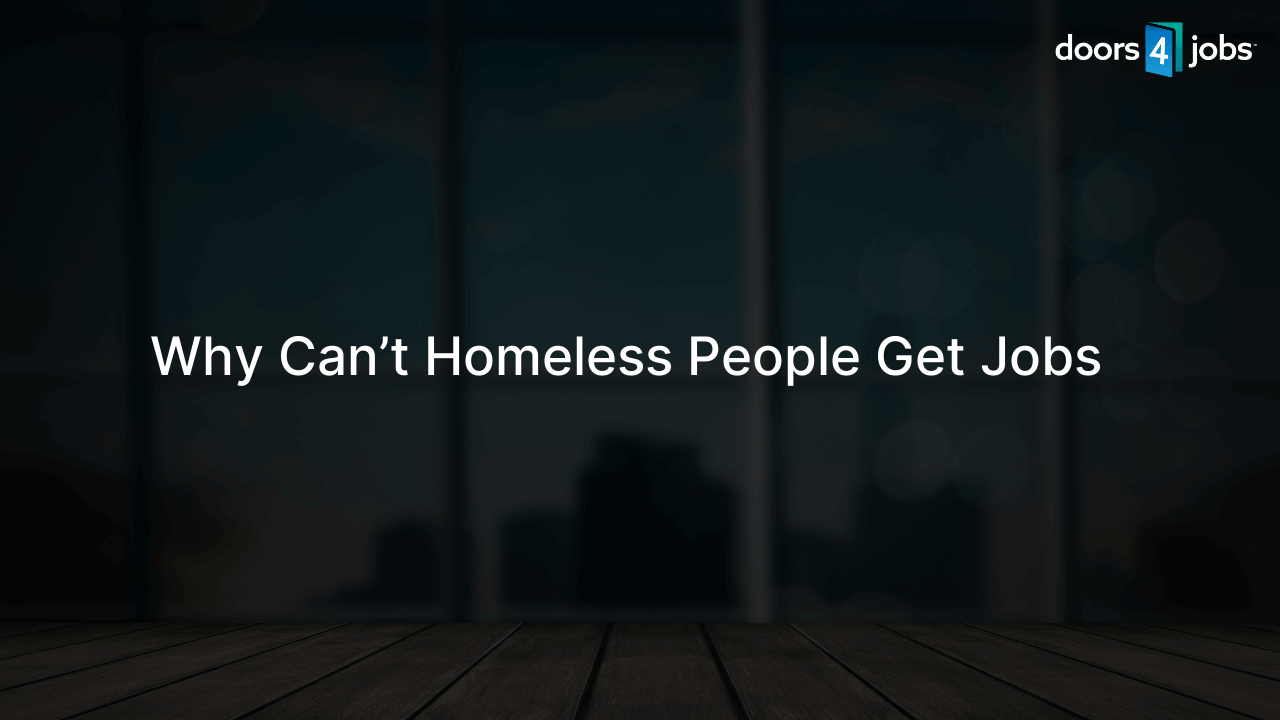Homeless people often struggle to secure jobs due to a combination of factors, including lack of stable housing, limited access to proper hygiene and healthcare, absence of necessary documentation, employment and digital gaps, and social stigma. These challenges create a cycle of disadvantage, making it difficult for homeless individuals to successfully enter the job market.
The Cycle of Disadvantage for Homeless Job Seekers
Understanding why homeless individuals struggle to secure employment requires an examination of the multiple factors hindering their ability to enter the job market. These factors intertwine in a complex cycle of disadvantage, making it difficult for homeless people to break free from their circumstances.
Lack of Stable Housing
Without a fixed address, homeless people often face difficulty in securing a job, as many employers require a permanent residence for legal and communication purposes. Additionally, a lack of consistent shelter disrupts everyday routines, making it challenging for homeless individuals to maintain a job even if they manage to find one.
Access to Hygiene and Healthcare
Personal Hygiene
Clean and professional appearances play a crucial role in job interviews. Homeless people, lacking regular access to clean clothes and personal care facilities, are often at a disadvantage concerning their appearance, leading to a negative impression on potential employers.
Physical and Mental Health
Homeless individuals often experience health issues, which can be exacerbated by insufficient access to healthcare. These health problems can make it difficult for people to secure and maintain jobs, while mental health challenges further impede their efforts to find work.
Documentation and Identification Barriers
Essential documents such as identification cards, birth certificates, and social security numbers may be lost, stolen, or damaged while living on the streets. Without proper documentation, homeless individuals face immense difficulty in securing a job as they cannot prove their identity or right to work.
Employment and Digital Gaps
Employment History Gaps
Being out of work for extended periods can lead to “employment gaps,” which are often seen as red flags by employers. As homeless individuals go through long spells without employment, this further harms their prospects of securing a job.
Digital Divide
Modern job markets rely heavily on the internet for job searches and applications. Limited access to computers, smartphones, and the internet inhibits the ability of homeless people to search for jobs effectively and submit online applications required by many employers.
Social Stigma and Discrimination
Unfortunately, societal biases can lead to discrimination against homeless individuals during the hiring process. Employers may have preconceived notions about these job seekers, wrongly perceiving them as unreliable or unqualified, making it more difficult for them to secure employment.
Education and Skill Development
Homeless individuals often face limited access to education and skill development opportunities, resulting in a lack of certificates, diplomas, or degrees. This lack of qualifications can make job-seeking more difficult, as many employers require a certain level of education, specialized training, or certifications for available positions.
Building a Professional Network
Networking plays a significant role in job hunting, as many job opportunities are found through referrals or personal connections. Homeless people often face social isolation due to their circumstances, causing them to lack the necessary connections to help with job placement, making it harder to find work through traditional support networks.
Transportation Challenges
Reliable transportation is essential for job seekers and employees alike, yet homeless individuals often lack consistent means of transportation. This limits their ability to attend job interviews, networking events or maintain regular working hours, as public transportation may not be readily available or affordable.
Overcoming Barriers: Programs and Initiatives
Homeless Employment Programs
Several organizations and nonprofits have stepped in to help address the difficulties faced by homeless job seekers. These programs often provide essential services such as job training, resume building, interview coaching, and job placement assistance designed specifically for homeless individuals seeking employment.
Housing First Initiatives
A growing number of communities are implementing “Housing First” initiatives aimed at providing permanent housing to homeless individuals with no preconditions. By ensuring the basic need for stable shelter is met first, people are better able to focus on overcoming other barriers to employment and reintegration into society.
Supportive Services
Achieving and maintaining employment is crucial for breaking the cycle of homelessness. As a result, several supportive services have emerged to help homeless individuals gain access to healthcare, hygiene facilities, educational resources, and mental health services. These initiatives aim to provide a holistic support network, addressing the various factors that hinder their ability to secure and maintain steady employment.
FAQ: Homelessness and Employment Barriers
Below are some frequently asked questions and concise answers related to the challenges faced by homeless individuals when seeking employment. This section aims to provide quick insights and additional information on the topic.
Why is stable housing so crucial in securing employment?
Stable housing provides a foundation for individuals to maintain routines, have a permanent address for employers and communication, and access their belongings. Without stable housing, it is challenging to manage job-related responsibilities consistently, leading to increased difficulties in finding and maintaining employment.
How does limited access to proper hygiene facilities affect job prospects for homeless individuals?
Poor hygiene can result in a negative first impression during interviews, impacting a person’s chances of getting hired. Having consistent access to proper hygiene facilities is crucial for maintaining a clean appearance, which is often required in professional settings.
Why is documentation and identification crucial for job seekers?
Job seekers must prove their identity and right to work to prospective employers. Without proper documentation or identification, homeless individuals may be unable to apply for jobs or secure employment due to legal and hiring requirements.
How do employment gaps impair a homeless person’s ability to find a job?
Employment gaps are often perceived negatively by employers because they may indicate a lack of recent experience or knowledge in a particular field. For homeless individuals, having periods of unemployment can make them less desirable to employers compared to other job seekers with more consistent employment histories.
What are some initiatives and programs designed to help homeless individuals find employment?
Several programs and initiatives aim to assist homeless job seekers, including homeless employment programs, “Housing First” initiatives, and supportive services. These programs typically provide services such as job training, resume assistance, interview coaching, and job placement to help homeless individuals overcome various employment barriers.











